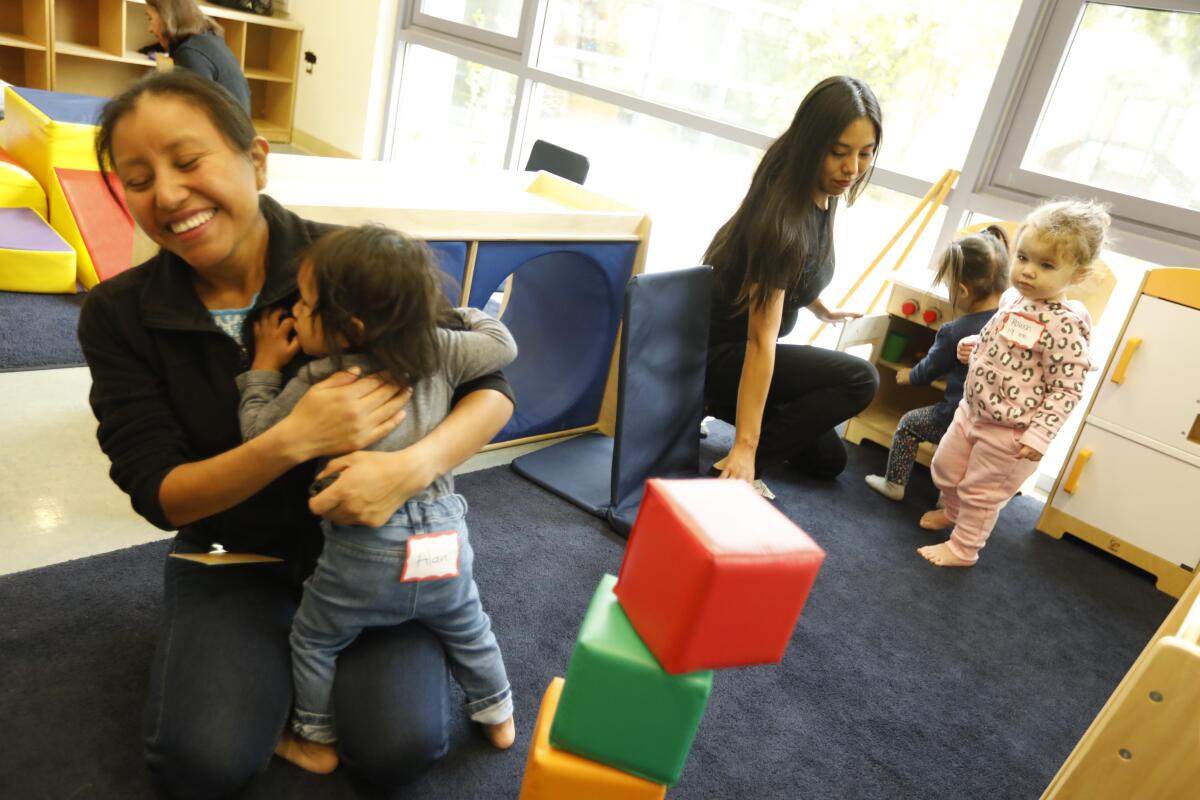For students with kids, college can be a lonely struggle. One program aims to help

Daisy Garcia’s small Van Nuys apartment doesn’t offer much space for her 9-month old daughter to crawl. So this 27-year-old college student brings her little one to a children’s play area at Los Angeles Valley College.
Here, under the watchful eyes of child educators and caretakers, is where the baby girl lifts herself up to stand next to a shelf, wobbles and plops back down on her bottom, legs landing in a “W” position.
‘W’ is bad for their backs,” Pam Fischer, a student worker, told Garcia. “So when you see ‘W,’ reposition her.”
The play area is one of the services offered at Valley College’s Family Resource Center, among a handful of such community college programs nationwide designed to assist student parents with what educators say are critically important but largely invisible needs.
Nationwide, 3.8 million — one out of every five — college students are parents. At community colleges, the share is even higher at about one in four. These students face unique obstacles to completing their education at a time when the economic stakes of dropping out are high. Yet there is little awareness about their struggles, educators and policymakers say.
“This issue had been somewhat invisible and it has now found its moment,” said Anne Mosle, vice president at the Aspen Institute, a think tank where she directs a “postsecondary success for parents” initiative.
As higher education leaders seek to increase success rates at community colleges, they are paying more attention to the demographics and non-academic needs of their students.
“We’ve done a lot to serve students who are low-income, students who are from diverse backgrounds,” Mosle said. “The parent lens is the next chapter of recognition ... of who is coming up this pipeline.”
Marni Roosevelt was ahead of the curve. As a Valley College child development professor in the early 2000s, Roosevelt often had students approach her for advice on how to handle difficulties with their children.
She realized many of her students were parents of young children — and didn’t know they shared this commonality.
“I figured if students could get together, they could support each other,” Roosevelt said.
Roosevelt invited them to meet in an empty classroom, pushing desks to the sides so their children would have a place to play. Then she applied for grants and hired interns to provide child care while the student parents met.
That evolved into what today is a dedicated building with indoor and outdoor play areas, a study lounge with desktop computers and printers, a baby clothing exchange and lending library, a break room with snacks, and a lactation room for mothers.
The Family Resource Center, adjacent to the college’s child care center and child development department, also runs a food pantry with fresh and organic produce from a local farmers market. It maintains a steady supply of diapers, wipes and infant formula to give to anyone who asks. The building was paid for by local developer J.h. Snyder, and the center’s $500,000 annual budget is fully funded by government grants and private donations.
Students can bring their children to play groups, join a parenting class or meet with an academic counselor or social worker. Across its various services, the center serves about 1,000 families a year. Child care, offered to students, staff, faculty and members of the community on a sliding scale, is available next door.
But the Family Resource Center offers students a place where they can attend to their children’s needs as well as their own.
Data suggest the services are working. In the 2017-2018 school year, 81% of students who used Family Resource Center services completed their semester, compared with 69% of students campus-wide, Roosevelt said.
“Students can’t access services [on campus] when their kids are with them,” she said. “They can’t bring them to the library when they need to study, they can’t bring them when they meet with a counselor.”
Providing that space is crucial, students say.
Garcia has been in and out of college for 10 years. She had to stop to work and support herself. And she couldn’t pass statistics, which blocked her progress.
She went back to school in 2018 determined to finish her associate’s degree and transfer to Cal State Northridge. But then she found out she was pregnant. Without child care and little support at home, it was hard to study.
When her daughter was 4 months old, Garcia started bringing her to the Family Resource Center. She uses its services and can work on her statistics homework in a computer lounge while child development interns watch her daughter. She’s finally doing better in the course.
“It benefits her and it benefits me as well,” said Garcia, who aspires one day to run a child care program.
Julianna Ontiveros, 29, has also taken advantage of the study time, as well as the center’s play group and parenting class. Ontiveros, who has two toddlers and is pregnant with her third child, already has a bachelor’s degree from UCLA but is working on pre-requisites for a master’s degree in school psychology. She works part time, too.
“Honestly, I couldn’t do it without them,” she said of the Family Resource Center.
Itchel Coronel Reyes, 30, tried twice before to go to college. The mother of two couldn’t afford day care or private preschool. She waited until both her sons, 4 and 6, were in school to enroll at Valley College — but still had little time for her own tutoring needs or meeting other parents.
The Family Resource Center has eased those pressures. “I’m still back and forth with my kids, but at least I’m able to do my homework,” Reyes said. “Being here gives me hope to finish something finally.”
California community college students are likely to come from racial and ethnic minorities, be the first in their families to attend college, go to school part time, work, and take on debt for their education.
“Student parents sit at the intersection of all of those trends,” said Lindsey Reichlin Cruse, a study director at the Institute for Women’s Policy Research. “If you want to increase student success, if you want to increase family economic security, you have to start paying attention to these students.”
Cruse said research has shown that affordable, high-quality child care is essential to enabling students to complete college. Managing the needs of each student is also particularly effective. At Valley College, a counselor and a social worker help students plan out their courses and enroll in services for which they and their kids are eligible.
Ensuring that student parents stay in school and finish is an economic imperative and creates a more skilled workforce, reduced poverty, lower spending on public assistance, and an increased tax base, Cruse said.
“There’s a huge economic return when student parents earn associate’s degrees,” Cruse said. “The return for single mothers is 12 to 1 — that has huge implications for their family’s success and their children’s success long term.”
There is a growing recognition among policymakers of the value of supporting student parents. In 2018, state Assemblyman Adrin Nazarian (D-Van Nuys) secured an $800,000 carve-out in the state budget to support the Family Resource Center over four years. He hopes the money will be used in part to collect data on program elements and student outcomes.
“I want this to potentially serve as a statewide model,” Nazarian said.
More to Read
Start your day right
Sign up for Essential California for news, features and recommendations from the L.A. Times and beyond in your inbox six days a week.
You may occasionally receive promotional content from the Los Angeles Times.







